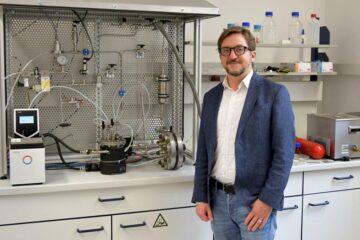Energy researcher at INM receives Bayer Award in the category "Materials"

Environmentally friendly, economic and highly efficient storage concepts, which are essential for the energy turnaround, have been missing so far.
For his pioneer work and his research work about such electrical energy storage systems, Volker Presser from the INM- Leibniz Institute for New Materials received the „Bayer Early Excellence in Science Award 2012“ in the category „Materials“ with prize money of 10,000 €.
The central technology behind the award-winning work is the double layer capacitor. It follows a simple principle: Ions in a liquid electrolyte counter balance the surface charge applied to one positive and one negative electrode, which are separated by a non-conducting, porous separator. Ions and electrons pair up at the interface between electrolyte and porous electrode, forming the so-called electric double layer. Energy stored within this double layer can be released within seconds.
Presser's research goal is to achieve a higher energy density in double layer capacitors, also known as supercapacitors, without affecting their extreme long life, which may be up to 25 years. „When we can accumulate more positive and negative charges and enable faster movement of the ions, then we immediately improve the energy storage capacity and the over performance of supercapacitors“, explains the junior scientist.
Presser's group achieves this by using highly porous carbons. It is the extreme large specific surface area which yields electrodes with a very high energy storage capacity; however, the resulting energy density is limited and even when using state-of-the-art material, still far below of the one of batteries. „Our approach is to include, so to speak, a little bit of a battery into a double layer capacitor“, says Presser. „For this purpose, we can incorporate metal oxides as nanoparticles in the electrodes. As an alternative approach to increase the energy density, we also use advanced electrolytes with extremely large electrochemical stability to enable the use of high cell voltages without being structurally damaged. All three approaches have contributed to answer a decisive question: How can we store energy in a highly efficient and economic way, based on environmentally friendly materials? Only if we succeed with finding a sustainable solution for this challenge, then we are able to make a real contribution to the economy, industry, and society of the 21st century.“
Background:
The Bayer Early Excellence in Science Award 2012 is presented by the Bayer Science & Education Foundation. This foundation pursues the goal to honor extraordinary research performances, to promote scientific talents, and support important scientific school projects. The promotion activities are based on technology, science, and medicine. Since 2009, this international award has been presented annually in the three categories biology, chemistry, and materials. The selection of the award is based on the originality and the quality of the candidate's research as well as the significance of the results for the specific category.
Contact:
Dr. Volker Presser
INM – Leibniz Institute for New Materials
Junior Research Group „Energy Materials“
Phone: +49681-9300-177
E-mail: volker.presser@inm-gmbh.de
INM is focused on the research and development of materials – for today, tomorrow and the future. Chemists, physicists, biologists, materials and engineering scientists shape the work at INM. From molecule to pilot production, they follow three essential questions: Which material properties are new, how can they be investigated and how can they be used for industrial and true-to-life applications in the future?
INM – Leibniz Institute for New Materials, situated in Saarbrücken/Germany, is an internationally leading centre for materials research. It is a scientific partner to national and international institutes and a provider of research and development for companies throughout the world. INM is an institute of the Scientific Association Gottfried Wilhelm Leibniz and employs around 190 collaborators. Its main research fields are Chemical Nanotechnology, Interface Materials, and Materials in Biology.
Media Contact
Alle Nachrichten aus der Kategorie: Förderungen Preise
Neueste Beiträge

Ideen für die Zukunft
TU Berlin präsentiert sich vom 22. bis 26. April 2024 mit neun Projekten auf der Hannover Messe 2024. Die HANNOVER MESSE gilt als die Weltleitmesse der Industrie. Ihr diesjähriger Schwerpunkt…

Peptide auf interstellarem Eis
Dass einfache Peptide auf kosmischen Staubkörnern entstehen können, wurde vom Forschungsteam um Dr. Serge Krasnokutski vom Astrophysikalischen Labor des Max-Planck-Instituts für Astronomie an der Universität Jena bereits gezeigt. Bisher ging…

Wasserstoff-Produktion in der heimischen Garage
Forschungsteam der Frankfurt UAS entwickelt Prototyp für Privathaushalte: Förderzusage vom Land Hessen für 2. Projektphase. Wasserstoff als Energieträger der Zukunft ist nicht frei verfügbar, sondern muss aufwendig hergestellt werden. Das…





















